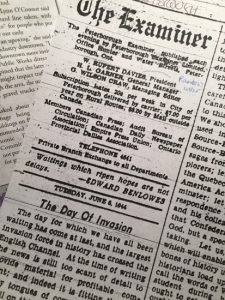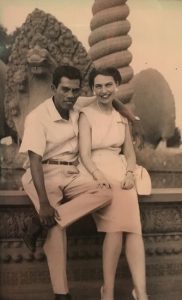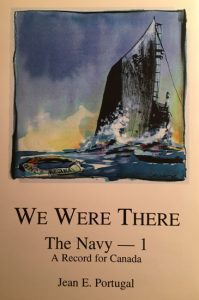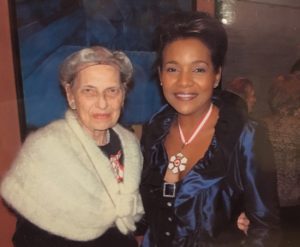 It was a spring day, not unlike others on the home front that year. And Canadians, as they had since 1939 when the Second World War began, looked eagerly overseas for news. Jean Portugal, in her second full year on the job at the Peterborough Examiner newspaper, faced one of those graveyard shifts working overnight. Suddenly, the wire service machine delivering international news into the Examiner newsroom, began to clatter. And night editor Portugal faced a difficult decision.
It was a spring day, not unlike others on the home front that year. And Canadians, as they had since 1939 when the Second World War began, looked eagerly overseas for news. Jean Portugal, in her second full year on the job at the Peterborough Examiner newspaper, faced one of those graveyard shifts working overnight. Suddenly, the wire service machine delivering international news into the Examiner newsroom, began to clatter. And night editor Portugal faced a difficult decision.
“I knew I would have to wake up one of the managers,” she told me in 2004. “The Allies had landed in Normandy, and I had to get permission to use Second-Coming-sized type on the front page.”

D-Day, the greatest military gamble of the Second World War had begun on the shores of Normandy, in France, and Jean Portugal sensed the resulting front-page story on June 6, 1944, required a typeface as large “as if it was the Second Coming of Christ,” she said. But she couldn’t make that decision without consulting her superior, and he was sound asleep at his Peterborough home.
“And that manager,” she went on, “was none other than Robertson Davies,” later one of Canada’s most celebrated novelists, essayists and playwrights.
But Jean Portugal’s bold decision-making – to wake up the boss, in this case – continued for a lifetime. As a feature writer, foreign news correspondent (in southeast Asia) and later ministerial editor for the Ontario Department of Municipal Affairs and editor-in-chief at Maclean Hunter, she fought her way up the ladder to prove her creativity, ingenuity and expertise in a writing and publishing world dominated by men.
Hers was, after all, a time when key jobs – reporters, editors and publishers – in the fourth estate (principally the print media) were considered a male domain. Ms. Portugal, “Mummy,” to her surviving husband, Felix, and closest friends, died of respiratory complications in Toronto on Nov. 26. She was 95.
I met her, or should I say she took me under her wing, long after she had broken all those glass ceilings in journalism, corporate communications and the civil service. I met Jean Portugal in the 1990s (when she was in her 70s) as she broke through yet another barrier; though military history was traditionally the realm of war correspondents, university professors and veteran military officers, she single-handedly recorded and assembled the first-hand stories of Canadian servicemen and women. No matter that scholars such as Jack Granatstein, Desmond Morton, Terry Copp and David Bercuson had long dominated the literary landscape of official military history.

Jean Portugal had decided to meet the vets face-to-face and having studied as much about their victories and defeats as any military scholar, put them at ease, won their confidence and – like the best journalists – got their real stories. There were seven volumes of them, entitled “We Were There,” 3,500 pages of riveting war stories that she managed to document before they disappeared untold.
Proof that her efforts were appreciated did not come from the book reviewers or the literary critics, but from the vets themselves … or their wives. In one case, the Royal Canadian Military Institute learned that the former stoker aboard HMCS Regina, Ted (Paddy) Flanagan, was dying of cancer near Christmas in 1998. The RCMI librarian rushed Jean’s first volume, “We Were There – The Navy,” to Flanagan.
“He would only read a page or two at a time, as he tired so easily,” Doris Flanagan wrote Jean from P.E.I. “Later I would read to him. Sometimes there was a hearty laugh, and others a tear or two, as he relived that part of his life through your work.” When Paddy died, his family had a stand placed at the head of his coffin displaying his medals and Jean’s book.
“It was one of my rewards,” Jean wrote me in 2004, “and the reason I did the books.”

Another equally deserved award came in 2007, when she was inducted into the Order of Canada, by Governor General Michaelle Jean.
But on that D-Day back in 1944, when she decided to wake up the Examiner’s senior manager, Jean Portugal had not only pushed for Second-Coming-sized type, but she had also paused long enough to offer a written commentary. They were the first impressions of an informed journalist and an anxious Canadian, as she composed the newspaper’s op ed page editorial that June 6, 1944, morning. She captured the essence of the moment and transformed it into poetry and a piece of history.
“The day for which we have all been waiting has come at last,” she wrote in the D-Day edition. “And the largest invasion force in history has crossed the English Channel. At the time of writing, the news is still too scant of detail to provide material for profitable comment; and indeed it is fitting that the ready tongues of commentators should be still on this momentous occasion. For what is there to say? Nothing except that the land invasion of Europe has begun and that, God willing, it will free all of Europe in time.”
For the trail Jean Portugal blazed for me and the profession, I am eternally grateful.
To Ted Barris: What a wonderful and touching tribute in honour of Jean Portugal. She made a lasting impression on so many in the newspaper world and the communications arena.
I had prepared a tribute piece in 2011, in advance, which I will share with the fraternity. But my written effort pales in comparison to yours, Mr. Barris.
I propose to honour and pay tribute to Jean Portugal’s many contributions by organizing, I hope, a reception at the Royal Canadian Military Institute in the new year, in concert with family wishes. A gathering of war veterans, newspaper professionals, and people from all walks of life who knew Jean and, of course, her devoted husband, Felix, dear family and close friends. It is surely fitting to do so, at the Institute where she launched her memorable 7 volume war books, and at the place that became, in a manner of speaking, her second home.
To you, Ted, many thanks for remembering Jean by writing such a beautiful tribute when it is too easy, these days, in the midst of computer technology, to let time go by, and forget.
Kindest regards,
Richard MacFarlane
Toronto, Canada
Hi Richard… Thanks for your lovely response to the piece on Jean Portugal. We in the writing profession owe her much. When I visited Felix before the funeral, his family gathered ’round, but it was clear he was so very loney without his extraordinary mate. I would be honoured to be part of any RCMI tribute you or the organization might plan. Please let me know… Ted.